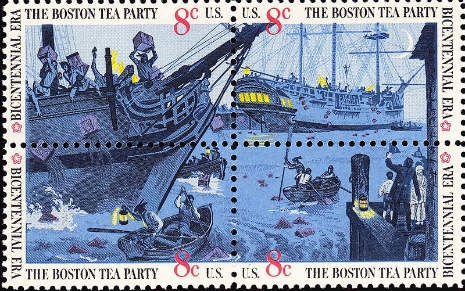
An 8 cent stamp from 1973
On December 16th, 1773, a group of between 70 and 130 citizens of Boston, outraged they were obliged to pay taxes to the British government (who did not represent them) and by the monopoly held on much of what was imported into America at that time (like tea, silks, spices, saltpeter for making gunpowder) by the East India Company—the world’s very first mega-corporation that was somewhat synonymous with the British Empire, especially in India—took direct action and threw 342 chest of tea into Boston Harbor.
The background is probably unknown today by most Americans, but considering the irony that the name of this most iconic of American historical events has been hijacked by folks who want to give tax cuts to billionaires, it’s worth sketching out:
The East India Company, trying to stave off bankruptcy due to the undercutting of their markets by Dutch tea smugglers, asked for financial help from the British Parliament who passed Tea Act in 1773. This law exempted East India from having to pay a 25% duty (to Britain) on tea exported to America, where it was still taxed as an import. Although the price of tea actually dropped in America—pissing off the domestic tea merchants, who weren’t exempt—the Tea Act of 1773 would have set a precedent for the crown to impose more taxes in the future (like the hated Townshend Acts of six years earlier). Three colonies turned away the tea at their harbors, but in Boston, Royal Governor Thomas Hutchinson refused to allow the tea to be boycotted. To his surprise, the angry colonists boarded three ships (dressed as Mohawk Indians) and destroyed $18,000 worth of tea, egged on by up to 7000 supporters on the shore.
Parliament’s reply was the Coercive Acts of 1774 which included tighter British military control of the colonies and a tax to repay the East India Company for the destroyed tea. Boston was to be punished by a closed port until that happened. This in turn, led to seething resentment and to the convening of the First Continental Congress, which demanded that the monarchy repeal the acts.
As most Americans know, or should know, these acts of civil disobedience lit the fuse of what would become the American Revolution. The American Revolutionary War began in 1775, but had been “brewing” for years
Dorian Cope had this to say about the Boston Tea Party at her On This Deity blog:
“As a historical and iconic act, the Boston Tea Party is to modern Americans synonymous with the spirit of their country’s independence – being the very embodiment of the New World’s rejection of Old World tyranny. It is also significant as one of the first examples of mass civil disobedience; resistance to taxation had never before resulted in the large-scale and deliberate destruction of property. But it is worth noting that, were the Tea Party to take place today, then every one of those so-called great patriots who participated would – under the Federal Bureau of Investigation’s current guidelines – be classified as “terrorists”. Hence, when casting our judgement on current resistors and freedom fighters, it is wise to remember that past political actions have always been measured by future generations solely by their success or failure – for, as Winston Churchill said, “history is written by the victors.’”